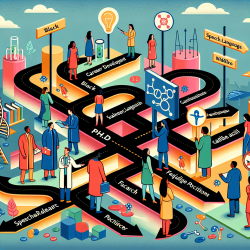As a practitioner in the field of speech-language pathology, it's crucial to stay updated with the latest research to improve outcomes for your clients. The study titled "Implementing Team-Based Post-Stroke Telerehabilitation: A Case Example" offers valuable insights into the effectiveness of telerehabilitation, especially when executed through an interdisciplinary team approach. This blog aims to distill the key findings from this research to help you enhance your practice.
The Power of Interdisciplinary Teams
One of the standout features of the study is its focus on interdisciplinary collaboration. The research highlights how a coordinated effort among physical therapists, occupational therapists, and speech-language pathologists can significantly improve post-stroke recovery outcomes. The team-based approach not only optimizes the treatment plan but also ensures that each professional's expertise is fully utilized.
Key Takeaways for Practitioners
Here are some actionable insights from the study that you can implement in your practice:
- Structured Communication: Use tools like the "Pass It On" template to facilitate efficient information sharing among team members.
- Functional Activities: Incorporate activities that are meaningful and relevant to the client's daily life to enhance motivation and engagement.
- Regular Team Meetings: Hold bi-weekly meetings to brainstorm and coordinate interdisciplinary activities that can be integrated into the client's routine.
- Use of Technology: Leverage platforms like Microsoft Teams and Planner for real-time communication and task management.
Case Example: Dipika Aggarwal
The case study of Dipika Aggarwal, a 37-year-old neurologist who suffered a moderate stroke, serves as a compelling example. Despite initial challenges, the interdisciplinary team helped her achieve significant improvements in her physical and communicative functions. The team used a combination of discipline-specific and interdisciplinary activities to facilitate her recovery, demonstrating the efficacy of this approach.
Encouraging Further Research
While the study provides promising results, it's essential to continue researching the long-term effects and scalability of team-based telerehabilitation. Practitioners are encouraged to explore additional studies and contribute to the growing body of evidence supporting this service delivery model.
To read the original research paper, please follow this link: Implementing Team-Based Post-Stroke Telerehabilitation: A Case Example










